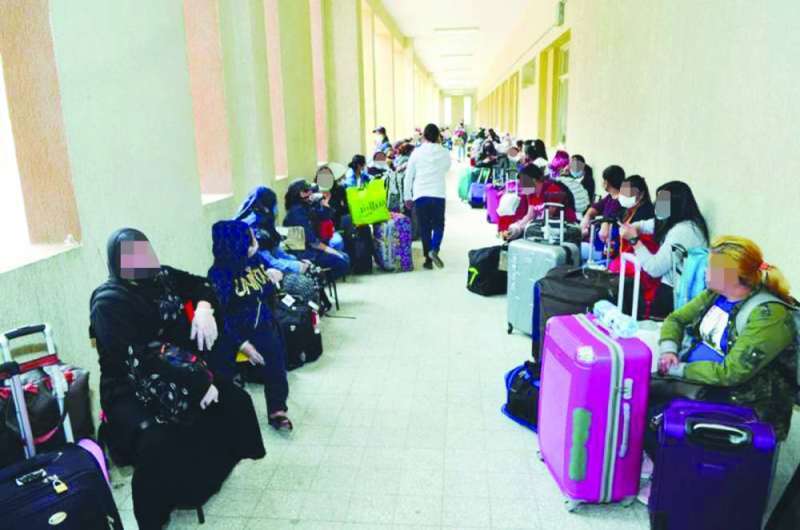Latest News
- New Tunnel Opened In Cairo Street Project
- To Address Regional Issues, Kuwait Joins The OIC Summit
- Streets, Services, And Infrastructure To Be Developed In Shuwaik...
- Passports Of Kuwaitis Involved In Drug Crimes Abroad Revoked By...
- Right To Privacy And Respect For The Dead
- Compatriots Scam Egyptians
- Mother And Daughter Arrested For Prostitution And Extortion
- Two Male Nurses Break Bones In A Fistfight
- Former Minister Arrested On Arrival Over Graft
- Ministry Of Education Uncovers Salary Payments To Absentees
- Kuwait Banks Seek Clarity From Central Bank On Citizenship Revoc...
- Kuwait Organizes 30 Events To Protect Children From Tobacco Indu...
The Problem Of Domestic Workers Will Worsen During Ramadan

The holy month of Ramadan is approaching, and citizens are eager to hire domestic workers at a time when experts in domestic labor affairs and human rights activists warn that "the problem will worsen in the holy month because of the high cost of hiring this category of workers, which has spiraled out of control and has reached nearly 2000 dinars or a little less, for those who want to hire immediately," and some are preparing to bear the brunt of the burden.
They also demanded that "employers and domestic employees be educated about their rights and responsibilities," emphasizing that "the transgressions that some are subjected to cannot be generalized," according to a report.
"The high fees for recruiting domestic workers, which state legislators failed to limit and are paid to the office rather than the workers," they reasoned, "made the employer seek ways to violate the law in order to force the domestic worker to complete the contract period, or sometimes longer than the contracted period."
Initially, Bassam Al-Shammari, a domestic labor expert and the owner of a domestic labor business, warned the newspaper that "the problem of domestic labor will intensify in the month of Ramadan," noting that "the nature of this month increases the expense burden"
He stated that there is a segment of domestic workers who work for others rather than their sponsor in mutual agreement with the sponsor, and another segment who work for small projects owned by the sponsors, in addition to the fact that approximately half of the domestic workers in Kuwait are male workers, implying a significant shortage.
"The openness measures helped revive domestic workers," he said, adding that "an Ethiopian delegation would visit Kuwait to sign the final agreement as part of Ethiopian attempts to visit a number of countries in the region, including Oman and Bahrain" to sign similar accords.
"Indonesia sends its workers to the rest of the Gulf countries except Kuwait because some of these countries have abolished the sponsorship system and others have adhered to the requirements demanded by the Indonesian side," he said, adding that "the requirement for the Philippine Foreign Ministry to ratify the criminal status agreement for Filipino workers will delay the arrival of Filipino domestic workers by approximately three months."
Hussein Al-Otaibi, Secretary of the Kuwait Society for Human Rights, spoke of the "need to consider the humanitarian aspects in dealing with domestic workers," adding that "the association has issued several publications in different languages in an effort to help domestic workers know their rights."
"The association has established a special unit to monitor and follow up issues of migrant workers' rights in Kuwait, to shed light on employment issues and issue periodic analytical reports," he said, adding that "domestic workers make up about a third of the workforce in Kuwait, and some of them are subject to violations of their rights, but these violations remain ‘stray incidents' and cannot be generalized."
"Although the rights mentioned in the domestic labor law do not rise to the level of guaranteeing all human rights of domestic workers, some of those rights are not granted, whether in a large or incomplete way, such as set working hours, rest periods, and weekend days off, and allowing workers to leave the house outside working hours," Taher Al-Baghli, Secretary of the Humanitarian Line Organization, told the daily.
Trending News
-
 Expat Residency Law Amended By Kuwait Ministerial...
20 April 2024
Expat Residency Law Amended By Kuwait Ministerial...
20 April 2024 -
 Ministry Announces Separate Time For Amnesty Seeke...
21 April 2024
Ministry Announces Separate Time For Amnesty Seeke...
21 April 2024 -
 The Ministry Connects With Violators Of Residency...
23 April 2024
The Ministry Connects With Violators Of Residency...
23 April 2024 -
 AstraZeneca Admits Covid Vaccine Can Cause Rare Si...
29 April 2024
AstraZeneca Admits Covid Vaccine Can Cause Rare Si...
29 April 2024 -
 Work Permits Will Be Issued For One Year Under The...
27 April 2024
Work Permits Will Be Issued For One Year Under The...
27 April 2024 -
 3 Expats Caught In Salmiya With 213 Bottles Of Loc...
23 April 2024
3 Expats Caught In Salmiya With 213 Bottles Of Loc...
23 April 2024 -
 Temperature Increases Cause Electricity Load Index...
21 April 2024
Temperature Increases Cause Electricity Load Index...
21 April 2024 -
 Al-Nuer Festival Celebrates Kuwaiti Agriculture Wi...
22 April 2024
Al-Nuer Festival Celebrates Kuwaiti Agriculture Wi...
22 April 2024 -
 Peak-time 'cut-offs' Raise Fears Of An Electricity...
22 April 2024
Peak-time 'cut-offs' Raise Fears Of An Electricity...
22 April 2024 -
 Road Trip From Kuwait To Bahrain Via Saudi: Travel...
22 April 2024
Road Trip From Kuwait To Bahrain Via Saudi: Travel...
22 April 2024












Comments Post Comment